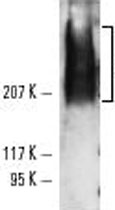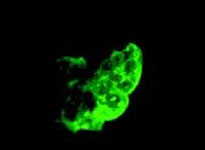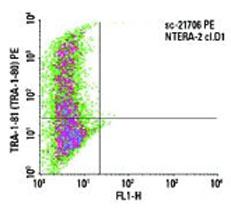TRA-1-81 monoclonal antibody, clone TRA-1-81

* The price is valid only in USA. Please select country.
- More Files
- Specifications
Product Description
Mouse monoclonal antibody raised against native TRA-1-81.
Immunogen
Native purified human embryonal carcinoma cell line 2102Ep.
Host
Mouse
Reactivity
Human
Form
Liquid
Isotype
IgM
Recommend Usage
Flow Cytometry (1:50-1:200)
Immunocytochemistry (1:50-1:200)
The optimal working dilution should be determined by the end user.Storage Buffer
In buffer containing 0.09% sodium azide
Storage Instruction
Store at 4°C for short term. For long term storage store at -20°C or -80°C.
Aliquot to avoid repeated freezing and thawing.Note
This product contains sodium azide: a POISONOUS AND HAZARDOUS SUBSTANCE which should be handled by trained staff only.
- Applications
Western Blot (Cell lysate)
Western blot analysis of TRA-1-81 expression using TRA-1-81 monoclonal antibody, clone TRA-1-81 (Cat # MAB2392) in NTERA-2 cl.D1 whole cell lysate.Immunohistochemistry
Immunocytochemistry
Immunofluorescence
Immunofluorescence staining of methanol-fixed NTERA-2 cl.D1 cells showing membrane localization using TRA-1-81 monoclonal antibody, clone TRA-1-81 (Cat # MAB2392).Immunoprecipitation
Flow Cytometry
Indirect FCM analysis of NTERA-2 cl.D1 cells stained with TRA-1-81 monoclonal antibody, clone TRA-1-81 (Cat # MAB2392), followed by PE-conjugated goat anti-mouse IgM. - Publication Reference
- Preimplantation human embryos and embryonic stem cells show comparable expression of stage-specific embryonic antigens.
Henderson JK, Draper JS, Baillie HS, Fishel S, Thomson JA, Moore H, Andrews PW.
Stem Cells 2002 Jan; 20(4):329.
Application:Flow Cyt, Human, Human embryonic stem cell lines, H7 and H14.
- The human embryonal carcinoma marker antigen TRA-1-60 is a sialylated keratan sulfate proteoglycan.
Badcock G, Pigott C, Goepel J, Andrews PW.
Cancer Research 1999 Sep; 59(18):4715.
Application:WB-Ce, Human, 2102Ep cells.
- Preimplantation human embryos and embryonic stem cells show comparable expression of stage-specific embryonic antigens.












